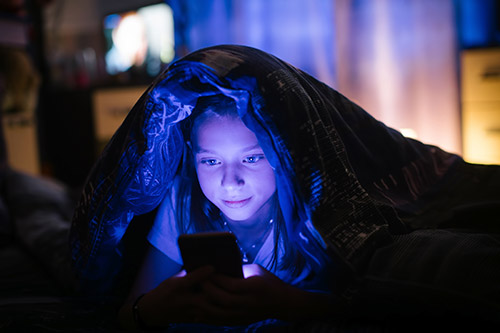2020-05-27 00:00:00Z

A lot of us has a bad habit of checking our smartphones for last updates before finally drifting off to sleep. Today we’re going to educate you on why this is not ideal as it pertains to your vision health. The blue light in our phone’s screens can negatively affect the eyes and disrupt our circadian rhythm (biological clock).
The sun is our natural and primary source of blue light to which we are designed to respond. As a result, we feel more awake and energetic to perform different tasks and routines in daylight. Conversely, the absence of blue light cues our brain that it is time to hit the sack. However, our smartphone screens are also releasing artificial blue lights. When we use them at night, the artificial blue light released by this gadgets signals us to stay awake and this impedes the production of melatonin (hormones that regulate the sleep-wake cycle). The blue light messes up with our sleep cycle and quality. We know that lack of sleep impacts our health negatively.
Avoid using smartphones at least an hour before you hit the hay. But in case, this is not possible for you, you could at least set your phone into night mode or search for an application that lowers blue light when you use your phone at nighttime.
Many believed that blue light has similar harmful effects as UV radiation. Fortunately, our phone screens don't release same large amount of blue light as the sun and not emitting UV radiation as well.
However, with extended screen time, eye strain is a common issue. So whenever you need to use the computer or smartphone for long periods, use computer glasses or screen filters. In addition practice the 20-20-20 rule (every 20 minutes, look on something that is 20 feet away from your computer for 20 seconds).
For more eye care tips, contact VisualEyes Optometrists.
(703) 417-9316
(703) 671-1188
(703) 764-3937
(703) 804-0355
(Pentagon ID Holders Only)
5876 Kingstowne Center Alexandria, VA 22315
Visit Website Make Appointment4018 Campbell Avenue Arlington, VA 22206
Visit Website Make Appointment9600 H. Main Street Fairfax, VA 22031
Visit Website Make Appointment1 South Rotary Road, STE 2C113
Arlington VA 22202
(For Authorized Pentagon Personnel Only)
Copyright 2025 VisualEyes Optometry. All rights reserved. Website Designed and Maintained by WSI Pro Marketing.
